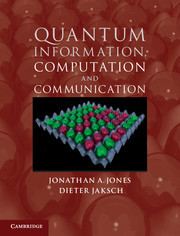Description
Quantum Information, Computation and Communication
Authors: Jones Jonathan A., Jaksch Dieter
Based on years of teaching experience, this textbook guides physics undergraduate students through the theory and experiment of the field.
Language: English
Subject for Quantum Information, Computation and Communication:
Approximative price 63.72 €
In Print (Delivery period: 14 days).
Add to cart
Publication date: 07-2012
208 p. · 19.5x25.3 cm · Hardback
208 p. · 19.5x25.3 cm · Hardback
Description
/li>Contents
/li>Biography
/li>
Quantum physics allows entirely new forms of computation and cryptography, which could perform tasks currently impossible on classical devices, leading to an explosion of new algorithms, communications protocols and suggestions for physical implementations of all these ideas. As a result, quantum information has made the transition from an exotic research topic to part of mainstream undergraduate courses in physics. Based on years of teaching experience, this textbook builds from simple fundamental concepts to cover the essentials of the field. Aimed at physics undergraduate students with a basic background in quantum mechanics, it guides readers through theory and experiment, introducing all the central concepts without getting caught up in details. Worked examples and exercises make this useful as a self-study text for those who want a brief introduction before starting on more advanced books. Solutions are available online at www.cambridge.org/9781107014466.
Part I. Quantum Information: 1. Quantum bits and quantum gates; 2. An atom in a laser field; 3. Spins in magnetic fields; 4. Photon techniques; 5. Two qubits and beyond; 6. Measurement and entanglement; Part II. Quantum Computation: 7. Principles of quantum computing; 8. Elementary quantum algorithms; 9. More advanced quantum algorithms; 10. Trapped atoms and ions; 11. Nuclear magnetic resonance; 12. Large scale quantum computers; Part III. Quantum Communication: 13. Basics of information theory; 14. Quantum information; 15. Quantum communication; 16. Testing EPR; 17. Quantum cryptography; Appendixes; References; Index.
Jonathan A. Jones is a Professor of Physics at the University of Oxford, where he lectures on quantum information. His main research interest is in NMR implementations of quantum information processing.
Dieter Jaksch is a Professor of Physics at the University of Oxford, where he lectures on quantum information. His main research interest is the theory of ultracold atomic gases, with a focus on their potential applications in quantum information processing.
Dieter Jaksch is a Professor of Physics at the University of Oxford, where he lectures on quantum information. His main research interest is the theory of ultracold atomic gases, with a focus on their potential applications in quantum information processing.
© 2024 LAVOISIER S.A.S.




